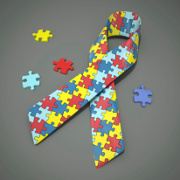 iStockphoto/Thinkstock
iStockphoto/Thinkstock
I often write articles on what having a particular medical condition may be like and ways to cope with it or prevent flare ups. But very few of my articles tell the other side of the story — what it’s like to be a parent, caregiver, guardian of someone with a particular disorder, condition, or illness.
As a parent of an ASD child, I thought I'd change my usual article-writing topics this time.
What it’s Like Being an ASD Parent
Parents of children with an autism spectrum disorder face a slightly different experience than parents of children who have more obvious disabilities (i.e., being in a wheelchair) because many children on the autism spectrum appear “normal”. And because the child appears normal, people don’t know that he sees and processes the world completely differently.
Many parents have experienced the glares from other grocery shoppers or restaurant patrons when a child has a temper tantrum. You know, the “why don’t you discipline your child better” type of glare.
They don’t know it’s not a discipline issue. They don’t know that this is your child’s only way of dealing with the stress of strangers around, bright lights, the din of people talking and towering shelves with a dizzying array of colors.
Again, to many people, children on the autism spectrum appear “normal” — but inside, they're very different.
What is Autism Spectrum Disorder?
Autism spectrum disorder (ASD) is an umbrella term used to describe a variety of disabilities, including autism, Aspergers syndrome, and other cognitive disorders, ranging from very mild to extreme. (4)
For a child with ASD, a “meltdown” is simply because his world is too overwhelming for him to process. It has nothing to do with anger or being belligerent and not getting his way. It’s about everything in the world around him — things that seem ordinary to us, but are major to him.
In general, ASD kids have to try so much harder to do the ordinary things other children and parents take for granted — personal hygiene, talking, identifying with people, understanding body language, reading, writing and personal organization.
Dealing with Others
Remember that many of those who comment and stare simply don’t know what autism looks like and they just assume that your child is being disobedient or defiant.
You have several choices when someone comments or glares at you:
1) You can yell at them and tell them that they know nothing about raising an ASD child and should just mind their own business. Really tempting sometimes.
2) Ignore them. Sometimes, this is best if the person commenting is a family member or friend or acquaintance who knows about the disability and yet chooses to ignore what it means.
3) Turn the moment into an educational moment by calmly telling them about your child’s disorder. Don’t apologize for your child’s behavior. Just help the other person understand — and probably the other people eavesdropping — what life is like for you and Joey.
4) Connect with other parents of children with learning disabilities and cognitive and physical difficulties. Surround yourself with people who are going through the same thing. They can support you and encourage you when you become discouraged, or when ignorant comments whittle their way into your mind and have you second-guessing yourself.
If you’re an ASD parent, please take the time to read Maria Lin’s Huffington Post article under Sources, below.
Sources:
1) What Do Parents of Children with Learning Disabilities, ADHD, and Related Disorders Deal With. Smith, Sally. Learning Disabilities Association of America. Web. Nov 13, 2012.
http://www.ldaamerica.us/aboutld/parents/help/parents.asp#top
2) Coping: Parents of Children with Learning Disabilities. Horowitz, Sheldon. National Center for Learning Disabilities. Web. Nov 13, 2012.
http://www.ncld.org/in-the-home/parenting-issues/coping-with-ld/coping-parents-of-children-with-learning-disabilities
3) 7 Things you Don’t Know About A Special Needs Parent. Lin, Maria. Huffingtonpost. Web. Nov 13, 2012.
http://www.huffingtonpost.com/maria-lin/special-needs-parenting_b_1314348.html
4) Autism Spectrum Disorder. National Institute of Mental Health. Web. Nov 13, 2012.
http://www.nimh.nih.gov/health/publications/a-parents-guide-to-autism-spectrum-disorder/what-is-autism-spectrum-disorder-asd.shtml
Reviewed November 13, 2012
by Michele Blacksberg RN
Edited by Jody Smith





Add a Comment9 Comments
This article really does not do any justice to what it means or the effort it takes to deal day to day with a child with autism. Its articles like this that make it seems if its like dealing with teething child then dealing with an on going struggle. I am not claiming that all circumstances are the same or that my childs autism is made life more or less hard for anyone else dealing with it. The article seems to be less researched then I would hope and more of a fluff piece than an actual attempt to inform or help any family.
Please in the future do not right a half hearted book report instead of actually doing research and field work.
December 15, 2012 - 1:22amThis Comment
That wasn't the purpose of this article. I wasn't trying to describe what it's like to take care of an autistic child. It was an experiential piece written from my experience as an ASD parent and from a discussion I recently had with other ASD moms about how the public perceives and how they react to something they know little about.
Obviously you were looking for a different article.
Honestly, I couldn't write an article about the all the challenges of taking care of an autistic child because each child is different. Mine is very high performing, while I know others who are non-verbal and far more severe than my son. Those experiences would be different from mine. I don't think one could write an all-encompassing article like that because there are so many variables in autism that makes each parent's experience different.
December 15, 2012 - 5:57amThis Comment
Deal with Autism and autism kid is really tough to handle your life.
November 26, 2012 - 12:20amSociety people and their awareness about this is very limited, live with autism is really tough. Need to become strong from inside.
This Comment
Surprisingly, assistance dogs can be a great help for children with autism (and their parents). See here: Leash-On-Life program of Tender Loving Canines Assistance Dogs-- http://www.tenderlovingcanines.org/programs/Autism-Service-Dogs.aspx
November 21, 2012 - 11:11amThis Comment
Great article. Touches on a problems lots of families share these days.
November 21, 2012 - 9:22amThis Comment
I work with some kids with autism at school, and even though everyone knows they're in Special Ed, most of the regular staff has no idea what they are really like or how they receive stimuli around them. I hear a lot of "Why can't they just..." "Why do you let them..." "What difference does it make if they have this one or that one?" I'm not a softie--I don't let kids play me just because they have a disability (and I have a few who try), but these kids with autism NEED certain things in order to function, and it makes me mad when other staff don't even try to understand. I wish I could put all those other people in a room with heavy metal blasting, strobe lights flashing, the temperature up to 90 or down to 40, scratchy material scraping their skin, and people up in their faces, and then tell them to use good manners and learn their school lessons. Our kids do learn manners and academics, and they are awesome, caring young men, but like you said, people just don't understand what they deal with. I doubt most of us could do half as well.
November 20, 2012 - 8:19pmThis Comment
Well said.
November 21, 2012 - 2:37pmThis Comment
Having an autistic child is devastating to many families not only from costs involved but the stress it causes internally. Thanks for share.
November 15, 2012 - 11:14amThis Comment
You're welcome, Marielaina!
November 15, 2012 - 1:04pmThis Comment